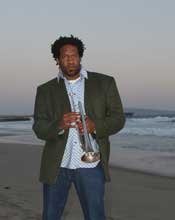Wherever Maurice Turner II is, so is his trumpet. It's not just some eccentric call for attention. "My band director loaned me a trumpet, and I left it in the study hall," he says. "It came up missing one day, and I've been carrying it around since I was 10 or 11—everywhere I go."
His instrument proves to be an icebreaker, too, he's learned. "I'm intimidating to most people when I come around," Turner says. "And I've found that (the trumpet) disarms people. They don't think 'stereotypical black man' when they see it and me. Their guards drop. ... It's my way of transferring a little positive energy in this world."
Most people know Turner, 36, as one half of M.U.G.A.B.E.E. (Men Under Guidance Acting Before Early Extinction)—an organization he and his younger brother, Carlton, started in 1996 as an artistic expression of jazz, hip-hop, spoken word and soul music "on a totally conscience tip."
The accomplished trumpeter has a resume that proves other greats in the music industry acknowledge his passion for the music. It includes Mississippi's own Cassandra Wilson and jazz legends like members of the Marsalis family. He's currently on two albums, which he anticipates releasing before the summer's end. "Watching Over Me" is a jazz album, and "Love Bomb: The End of the World As We Know It" is R&B.
The latter album, he says, "is about aspects of love from spiritual to physical to unconditional." This real love, he believes, transcends race. "f people were to practice real, true love, the world would change drastically," he says.
Turner grew up on an unincorporated piece of land between Utica and Raymond that old maps call Lebanon. It is family land, where his Native American, Irish and African roots run deep.
"We grew up with black people and white people. My father was shown great respect by the people around us. Even the white people," Turner says. "It wasn't until I became a teenager that there was a difference in how blacks and whites were treated. But where I lived was a lot more communal."
He adds, "The race issue is a made-up issue. The effects are real, but the actual race thing isn't real. We're human beings. Until we find out how to eco-exist, we're doomed."
And co-existence is not just about human interactions, he says. "We don't think about flushing the toilet four times a day and where that water goes. We buy products for cheap from Walmart, but we don't have a conscious mind about how we use energy and others' energy." When we genuinely love the environment in which we live and the people around us, Turner believes, we'll hearken back to the cooperative spirit of our foreparents. "They always made decisions that didn't hinder the earth from being what it is—a provider."



Comments
Use the comment form below to begin a discussion about this content.
comments powered by Disqus